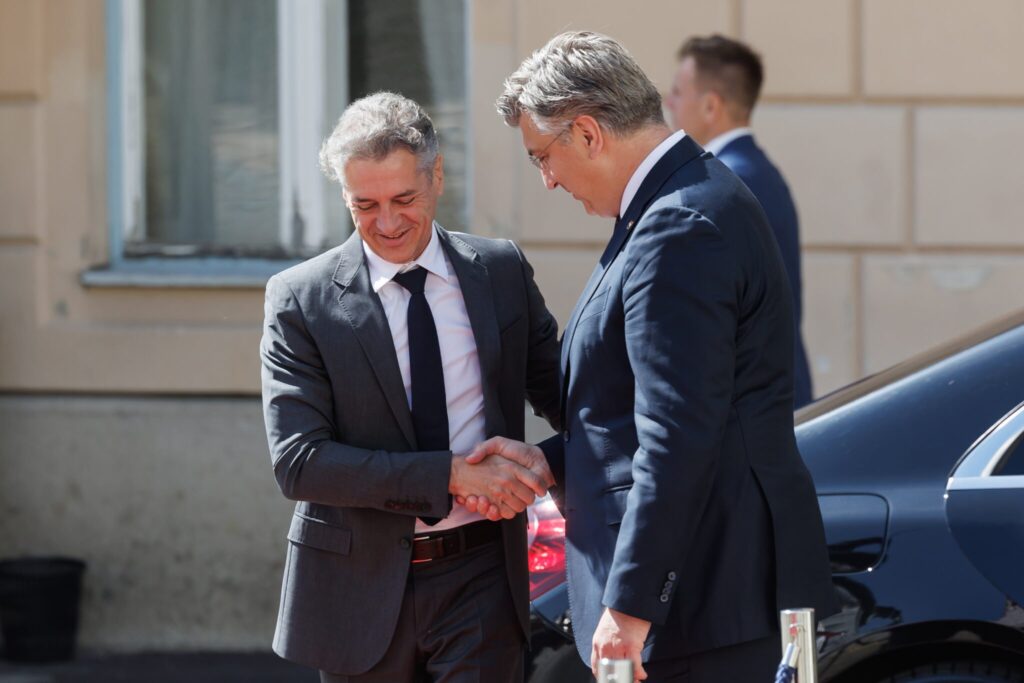During his recent visit to Croatia, Slovenian Prime Minister Robert Golob pompously announced the withdrawal of the arbitration issue from the political agenda. The mainstream media reported on the foreign policy reversal, as Slovenia’s policy so far has been to insist on the enforcement of the arbitration ruling. At the same time, Golob claims that Slovenia is still committed to it. Commenting on Golob’s move, Dr Miha Pogačnik, an expert on international law, said that international relations, by definition, cannot be part of everyday politics, while also revealing why the Prime Minister had to “partially give in” in Zagreb.
Only a year ago, at the Bled Strategic Forum, Prime Minister Robert Golob and his Croatian counterpart Andrej Plenković were on opposing sides of this argument. When asked about the arbitration, the Croatian Prime Minister replied: “The arbitration ruling is what it is, but our Parliament will never ratify it. I have said this openly to Prime Minister Golob.” But something had apparently changed in the bilateral relationship over the past year.
Lawyer Pogačnik began by explaining that international relations cannot, by definition, be part of everyday politics. The complex inter-state issues are resolved by diplomats in accordance with the rules of international law and diplomatic practices. Consequently, this also applies to the understanding of the arbitration agreement, the procedure, and the arbitral ruling on the inter-state border between Slovenia and Croatia.
Inadequate and harmful practice
The issue of the border between the two countries has nevertheless often been the subject of political fights in the past. This complex issue was taken off the political table with the arrival of the Janez Janša government. At that time, an inappropriate and harmful practice that cast a bad light on the maturity of Slovenian foreign and domestic policy gave way to “quiet diplomacy”.
As the international law expert explained, under international law, regardless of the validity or nullity of an arbitral ruling, states can always agree to different terms, “because international law, and in particular the peaceful settlement of disputes, which includes arbitration, is a highly dispositive subject. Thus, bilateral negotiations are welcome at all times during the arbitration process and even after the arbitration itself, which might lead to a solution that satisfies the minimum interests of both parties. Unfortunately, the previous government had too little time and a difficult operating environment, headed by the well-known pandemic.”
How to interpret the Prime Minister’s actions?
In his statement for our media outlet, Pogačnik speculated that Prime Minister Golob might have understood that “pushing for an arbitration ruling and deepening the conflict with Croatia would surely be seen as a cover-up of domestic political problems.” This is a common tactic, often used by countries or their leaders. And Slovenia and Croatia were no exception in this case. This pernicious tactic, Pogačnik argued, has been used mainly by left-wing governments, which have sought to cover up domestic failures, especially in the economic sphere, in order to divert public attention to problems in the foreign policy sphere.
“The other possibility is that, given the changed internal political situation and the HEP gas affair in Croatia, the latter has decided to take a harder line, which was previously softened by the excellent friendship between Prime Ministers Plenković and Janša. Croatia owes nothing to the current Slovenian Government, especially not in view of some of the positions and statements of the coalition partners. It is possible that this is why Dr Golob had to give in at least partially,” explained Pogačnik.
What was Golob doing in Zagreb?
Pogačnik concluded with the following: “In my opinion, Prime Minister Golob went to Zagreb to obtain, among other things, confirmation of further cooperation in this area, particularly in view of the energy situation, including electricity in Slovenia. It is also possible that Croatia has raised its expectations of Slovenia in terms of understanding the post-arbitration limbo in return for a reliable gas supply.”
Gal Kovač


